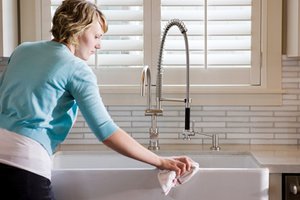
Sinks and drains take the brunt of kitchen cleanup duties, and they boast the scars and smells to prove it. Rather than reach for harsh commercial cleaners and de-cloggers, opt instead to green clean.
Make a non-toxic sink cleaner
Commercial stainless cleaners can run upwards of $10 a bottle, and they work no better than common household items. Add a few drops of a natural dishwashing liquid such as Mrs. Meyer’s ($4.50 for 16 ounces) or Method ($4 for 25 ounces) to warm water and use the solution to clean the surface of the sink. For hard mineral deposits, try squeezing lemon juice onto them, allowing them to sit a few minutes before wiping them away.
Make a simple scouring paste
Powdered cleaning products often contain harsh abrasives, corrosive chemicals, and eco-disastrous phosphates. Try making your own scratch-free paste by blending three parts baking soda to one part water.
De-stink your sink
If your sink stinks, try cleaning the drain with a paste made of vinegar and baking soda, both natural deodorizers. Simply sprinkle a quarter cup of baking soda down the drain, followed by an equal amount of vinegar. Give it time to work overnight. In the morning, rinse it all away with some boiling water.
Clear drain clogs without chemicals
Chemical drain cleaners work by blasting away clogs with caustic, corrosive ingredients like lye, bleach, and potash. Needless to say, they can be murder on your pipes.
The simplest remedy is often boiling water, which melts away the grease at the cost of almost nothing. For more stubborn clogs, pour half a cup of baking soda down the drain followed immediately by half a cup of vinegar. The chemical reaction that occurs will safely—and cheaply—blast away clogs.
Get sparkling dishes
Liquid dishwashing soaps can contain phosphates, which leech into lakes and cause destructive algae blooms. Ditch the detergent in favor of eco-friendly biodegradable soaps from Seventh Generation, Method or Mrs. Meyer’s, all of which rely on ingredients like aloe and essential oils to get the job done. You’ll pay a bit more, but when you consider that you eat off those dishes, the benefits clearly outweigh the cost.
Commercial stainless cleaners can run upwards of $10 a bottle, and they work no better than common household items. Add a few drops of a natural dishwashing liquid such as Mrs. Meyer’s ($4.50 for 16 ounces) or Method ($4 for 25 ounces) to warm water and use the solution to clean the surface of the sink. For hard mineral deposits, try squeezing lemon juice onto them, allowing them to sit a few minutes before wiping them away.
Make a simple scouring paste
Powdered cleaning products often contain harsh abrasives, corrosive chemicals, and eco-disastrous phosphates. Try making your own scratch-free paste by blending three parts baking soda to one part water.
De-stink your sink
If your sink stinks, try cleaning the drain with a paste made of vinegar and baking soda, both natural deodorizers. Simply sprinkle a quarter cup of baking soda down the drain, followed by an equal amount of vinegar. Give it time to work overnight. In the morning, rinse it all away with some boiling water.
Clear drain clogs without chemicals
Chemical drain cleaners work by blasting away clogs with caustic, corrosive ingredients like lye, bleach, and potash. Needless to say, they can be murder on your pipes.
The simplest remedy is often boiling water, which melts away the grease at the cost of almost nothing. For more stubborn clogs, pour half a cup of baking soda down the drain followed immediately by half a cup of vinegar. The chemical reaction that occurs will safely—and cheaply—blast away clogs.
Get sparkling dishes
Liquid dishwashing soaps can contain phosphates, which leech into lakes and cause destructive algae blooms. Ditch the detergent in favor of eco-friendly biodegradable soaps from Seventh Generation, Method or Mrs. Meyer’s, all of which rely on ingredients like aloe and essential oils to get the job done. You’ll pay a bit more, but when you consider that you eat off those dishes, the benefits clearly outweigh the cost.
Read more: http://www.houselogic.com/home-advice/green-cleaning/green-clean-sinks-drains-shine-em-up-clean-em-out/#ixzz3D75A8DRw
No comments:
Post a Comment